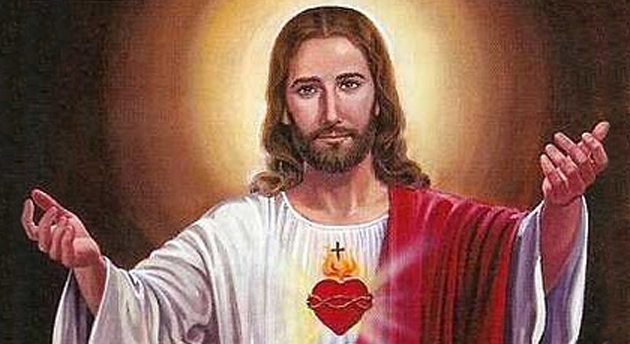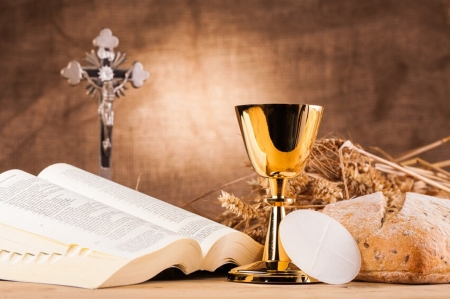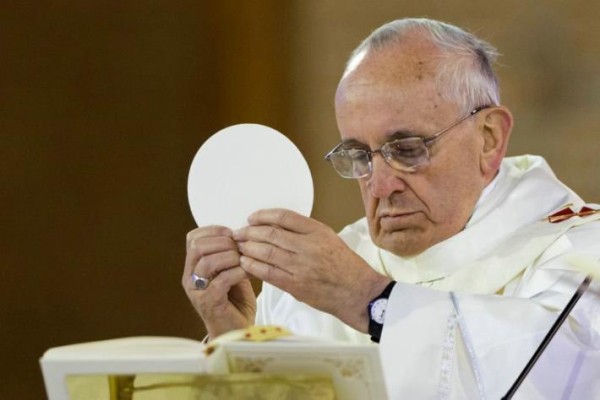Devotion to the Sacred Eucharistic Heart of Jesus
Devotion to the Sacred Heart: there is a passage in Pope Pius XII's encyclical that has become classic in describing how and of what the physical heart of Christ is the symbol.
“The heart of the Word incarnate", Says the Pope," is rightly considered the main sign and symbol of the threefold love with which the divine Redeemer continually loves the eternal Father and the whole human race.
"1. And the symbol of that divine love that he shares with the Father and the Holy Spirit. But that in Him alone, in the Word, that is, who became flesh, is manifested to us through His mortal human body, since "the fullness of the Divinity dwells bodily in Him".
- It is also the symbol of that love very ardent which, infused into his soul, sanctifies the human will of Christ. At the same time this love illuminates and directs the actions of his soul. By a more perfect knowledge derived from both beatific vision and direct infusion.

"3. Finally, it is also a symbol of the sensitive love of Jesus Christ, as his body. Formed by the Holy Spirit in the womb of the Virgin Mary, it has a more perfect capacity to hear and perception, much more than the body of anyone else.
Devotion to the Sacred Heart: in the Holy Eucharist there is the physical heart of Jesus
What must we conclude from all this? We must conclude that, in the Holy Eucharist, the physical heart of Christ is both the symbol and the effective sign of love. Of the Savior three times: once of the infinite love that he shares with the Father and the Holy Spirit in Holy Trinity ; once again of the created love for which, in his human soul, he loves God and loves us too; and again of the created affects by which also His bodily emotions are attracted by the Creator and by us unworthy creatures.
The look important of this is the fact that we have in the Holy Eucharist not only the physical Christ in his human and divine nature. Hence his heart of flesh substantially united to the Word of God. We have in the Eucharist the effective means by which we can show our love for God. For it is not only our affections when we unite them to the heart of the Eucharistic Christ. They are his affections united with ours. His love elevates ours, and ours consequently elevates itself to participation in divinity.

Holy Communion unites us to Jesus
But more than that. With our use of the Eucharist, that is, with our celebration of the Eucharistic Liturgy and with our reception of the heart of Christ. In Holy Communion, we receive an increase in the supernatural virtue of charity. We thus have the power to love God more than we would ever be able to do otherwise, especially by loving the people He gracefully, if often painfully, puts into our lives.
Whatever else the heart symbolizes is the most expressive sign in the world of outgoing charity.
Our language is full of terms that try to say something of what this means. We speak of a person as a loving individual when we wish to say that he is affable and kind in spirit. When we want to show our appreciation in a special way, we say that we are truly grateful or that we express our sincere gratitude. When something happens that lifts our spirits, we speak of it as a moving experience. It is almost colloquialism to describe a generous person as a big heart and a selfish person as a cold heart.
Thus the vocabulary of all nations goes on, always implying that deep affections are cordial and that the union of hearts is concord.

Devotion to the Sacred Heart: where does grace come from?
However, while everyone in every culture of history symbolize commonly selfless love for others as coming from the heart, everyone also realizes that truly selfless love is among the rarest commodities of human experience. Indeed, as our faith teaches us, it is not only a difficult virtue to practice, but at its highest levels it is impossible for human nature unless inspired and sustained by extraordinary divine grace.
It is precisely here that the Holy Eucharist provides for what we could never do alone: to love others with total self-denial. We must be animated by the light and strength that comes from the heart of Jesus Christ. If, as he said, "without me you can do nothing". Certainly impossible to give ourselves to others, tirelessly, patiently and continuously, in a word, from the heart, unless His grace gives us the power to do so.
And where does his grace come from? From the depths of his divine Heart, present in'Eucharist, offered daily for us on the altar and always at our disposal in the sacrament of Communion.
Animated by his help and enlightened by his Word made flesh, we will be able to love those who have no love, give to the ungrateful, support those that God's Providence puts into our life to show them how much we love them. After all, he loved us and loves us despite our lack of love, ingratitude and utter coldness towards the Lord who made us for Himself and who leads us to our destiny on the path of self-immolation, which is another name for sacrifice. We surrender to him as he surrendered for us, and so we make the Eucharist what Christ wants it to be: a union of God's heart with ours as a prelude to his possession of us for all eternity.
We end this article with reciting the prayer of consecration to the Sacred Heart of Jesus. Let's recite it every day, always and often have Holy Communion. Union with Jesus will be our strength.